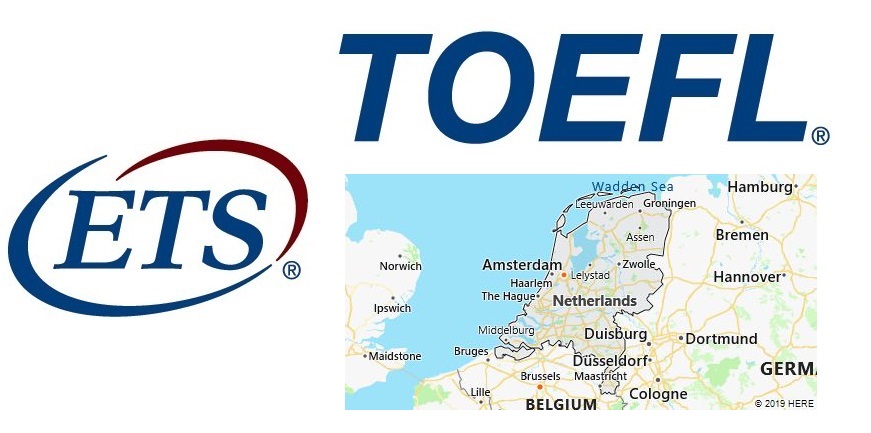The TOEFL iBT test is offered in this location.
The list below shows testing regions, fees and dates as of February 15, 2019, but availability may change when you register. Fees are shown in US$ and are subject to change without notice.
| Region | Testing Format | Fee | Test Dates |
|---|---|---|---|
| Amsterdam | TOEFL iBT | $255 $255 $255 $255 $255 $255 $255 $255 $255 $255 $255 $255 $255 $255 $255 $255 $255 $255 $255 |
Sat., Feb 16, 2019 Sat., Feb 23, 2019 Fri., Mar 08, 2019 Sat., Mar 09, 2019 Sat., Mar 16, 2019 Sat., Mar 30, 2019 Fri., Apr 05, 2019 Sat., Apr 13, 2019 Sat., May 04, 2019 Fri., May 10, 2019 Sat., May 11, 2019 Sat., May 18, 2019 Sat., Jun 01, 2019 Fri., Jun 14, 2019 Sat., Jun 15, 2019 Sat., Jun 29, 2019 Fri., Jul 12, 2019 Sat., Jul 13, 2019 Sat., Jul 27, 2019 |
| Netherlands (southern) | TOEFL iBT | $255 $255 $255 $255 $255 $255 $255 $255 $255 $255 $255 $255 $255 $255 $255 $255 $255 $255 |
Sat., Feb 16, 2019 Sat., Feb 23, 2019 Fri., Mar 08, 2019 Sat., Mar 09, 2019 Sat., Mar 16, 2019 Sat., Mar 30, 2019 Fri., Apr 05, 2019 Sat., Apr 13, 2019 Sat., May 04, 2019 Fri., May 10, 2019 Sat., May 11, 2019 Sat., May 18, 2019 Sat., Jun 01, 2019 Sat., Jun 15, 2019 Sat., Jun 29, 2019 Fri., Jul 12, 2019 Sat., Jul 13, 2019 Sat., Jul 27, 2019 |
Netherlands Overview
The Netherlands is a country in Western Europe with (2018) 17.2 million residents; The capital is Amsterdam.
The Netherlands also includes Aruba, Sint Maarten and Curaçao. These are three autonomous (independent) small islands that are located in the Caribbean. The Caribbean islands of Bonaire, Saba and Sint Eustatius have had the status of Special Dutch Communities since 2010 and are directly attached to the Netherlands.
Politics
According to the constitution that came into force on 1.3.1983 (amended several times), the Netherlands is a constitutional monarchy with a parliamentary-democratic system of government. The royal dignity is hereditary in the House of Orange-Nassau (since 1983 constitutional anchoring of female succession to the throne). The monarch acts as head of state and has formal executive and legislative powers. Indeed, the executive power at the state level rests with the Council of Ministers, which is dependent on parliamentary confidence and is chaired by the Prime Minister. The appointment and dismissal of the Prime Minister and Ministers are the responsibility of the monarch, and upon acceptance of their appointment they are accountable to Parliament. The bicameral parliament, the States General (Staten-Generaal; legislative period 4 years) come from a. the tasks of the legislature, the predominance lies with the second chamber (right of initiative and right of amendment). All laws require the consent of both chambers. The first chamber (75 members) is elected by the provincial states (provincial parliaments). The 150 members of the Second Chamber are elected by the people using the proportional representation system.
The party landscape in the Netherlands was characterized by a high degree of continuity for many decades. Since the beginning of the new millennium, the country has been in a phase of political upheaval – populist parties are now firmly established in the political landscape. Due to the political fragmentation, it is becoming increasingly difficult to form stable governments. The Prime Minister of the Netherlands has been M. Rutte from the bourgeois-liberal People’s Party for Vrijheid en Democratie (VVD) since 2010. Rutte was re-elected in 2012 and 2017 and governs with a coalition that includes the VVD, the Christian Democratic Appeal (CDA), the left-wing liberal D ’66 and the Christian Union (CU). Rutte stands for a pro-European policy. For the 2017/18 period, the Netherlands shared a seat with Italy as non-permanent members of the UN Security Council.
The active and passive voting age is 18 years. Each of the two chambers can be dissolved by royal decree (with ministerial countersignature). Laws are passed jointly by the government and the States General. Bills can be introduced by the monarch and the second chamber. The Council of State, which meets under the chairmanship of the monarch (a maximum of 28 members appointed for life by royal decree), is the advisory body of the government and parliament on all bills and international treaties as well as the highest administrative court. A two-thirds majority in parliament and the consent of the head of state are required for constitutional changes. There is no constitutional court.
Parties
the Communist Party of the Netherlands [Communist Partij van Nederland, CNP; founded 1918], the Evangelical People’s Party [Evangelical People’s Party, EPP; founded 1978] and the Radical Political Party [Politieke Partij Raduellen, PPR; founded 1968]), the Christian Union (Christen Unie, CU; created in 2000 through the merger of the Reformed Political Federation [RPF] and the Reformed Political Federation [GPV]), the Politically Reformed Party (Staatkundig Gereformeerde Partij, SGP; founded 1918), the party for the animals (Partij voor de Dieren, PvdD; founded in 2002) and the 50 Plus party (50 +; founded in 2009). founded 1978] and the Radical Political Party [Politieke Partij Raduellen, PPR; founded 1968]), the Christian Union (Christen Unie, CU; created in 2000 through the merger of the Reformed Political Federation [RPF] and the Reformed Political Federation [GPV]), the Politically Reformed Party (Staatkundig Gereformeerde Partij, SGP; founded 1918), the party for the animals (Partij voor de Dieren, PvdD; founded in 2002) and the 50 Plus party (50 +; founded in 2009). founded 1978] and the Radical Political Party [Politieke Partij Raduellen, PPR; founded 1968]), the Christian Union (Christen Unie, CU; created in 2000 through the merger of the Reformed Political Federation [RPF] and the Reformed Political Federation [GPV]), the Politically Reformed Party (Staatkundig Gereformeerde Partij, SGP; founded 1918), the party for the animals (Partij voor de Dieren, PvdD; founded in 2002) and the 50 Plus party (50 +; founded in 2009).

